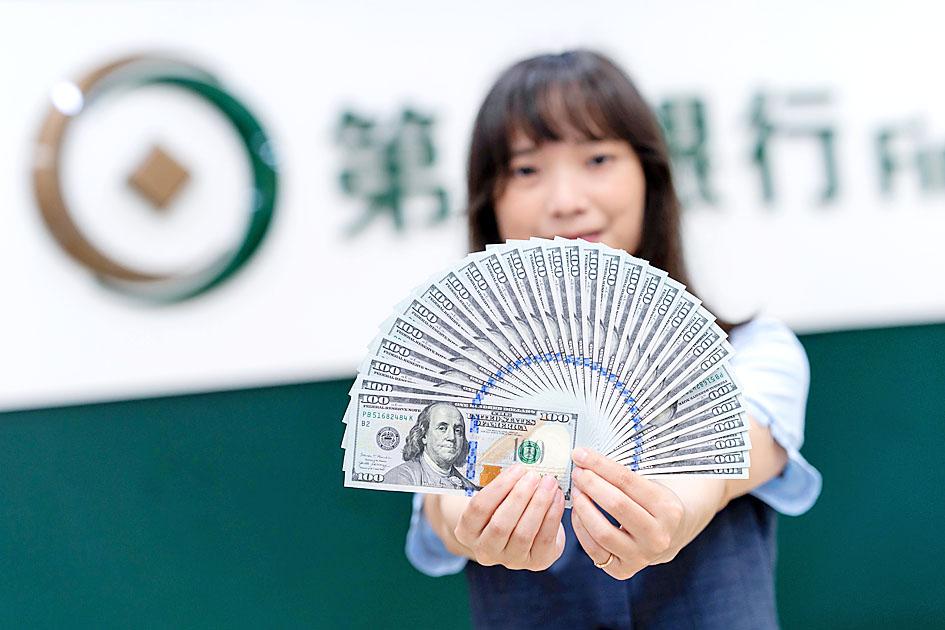Interest rates for new loans at the nation’s five major state-run banks last month rose 0.014 percentage points to 1.435 percent on average, as lenders raised borrowing costs for mortgages, consumer loans and corporate loans to boost working capital, the central bank said yesterday.
The adjustments came as Bank of Taiwan (臺灣銀行), Land Bank of Taiwan (土地銀行), Taiwan Cooperative Bank (合作金庫銀行), Hua Nan Commercial Bank (華南銀行) and First Commercial Bank (第一銀行) on Monday raised their interest rates after the central bank last week increased its discount rate from 1.375 percent to 1.5 percent to tame inflation.
PRE-COVID-19 LEVELS

Photo: Chen Mei-ying, Taipei Times
“Following the latest adjustments, interest rates for almost all banking operations returned to the level prior to the COVID-19 pandemic in March 2020,” when the monetary policymaker cut the discount rate by 0.25 percentage points to a historic low of 1.125 percent to ease the financial burden of borrowers, the central bank said in a statement.
New mortgages last month carried an annual interest rate of 1.601 percent, gaining 0.4 percentage points from April, the central bank said, as some lenders adjusted rates on a quarterly basis.
The rate would climb higher this month after the central bank introduced another rate increase of 0.125 percentage points on Friday last week and could tighten further if inflationary pressures fail to ease off.
Interest rates for corporate loans to boost working capital edged up 0.042 percentage points to 1.387 percent on average last month, while interest rates for consumer loans rose 0.1 percentage points to 2.356 percent on average, the central bank said.
GOVERNMENT LOANS
Interest rates for capital spending declined 0.248 percentage points to 1.558 percent on average for the five major banks, dragged by loans taken out by government agencies, the central bank said.
Government agencies enjoy lower borrowing costs due to their strong credit standing.

SEMICONDUCTORS: The German laser and plasma generator company will expand its local services as its specialized offerings support Taiwan’s semiconductor industries Trumpf SE + Co KG, a global leader in supplying laser technology and plasma generators used in chip production, is expanding its investments in Taiwan in an effort to deeply integrate into the global semiconductor supply chain in the pursuit of growth. The company, headquartered in Ditzingen, Germany, has invested significantly in a newly inaugurated regional technical center for plasma generators in Taoyuan, its latest expansion in Taiwan after being engaged in various industries for more than 25 years. The center, the first of its kind Trumpf built outside Germany, aims to serve customers from Taiwan, Japan, Southeast Asia and South Korea,

Gasoline and diesel prices at domestic fuel stations are to fall NT$0.2 per liter this week, down for a second consecutive week, CPC Corp, Taiwan (台灣中油) and Formosa Petrochemical Corp (台塑石化) announced yesterday. Effective today, gasoline prices at CPC and Formosa stations are to drop to NT$26.4, NT$27.9 and NT$29.9 per liter for 92, 95 and 98-octane unleaded gasoline respectively, the companies said in separate statements. The price of premium diesel is to fall to NT$24.8 per liter at CPC stations and NT$24.6 at Formosa pumps, they said. The price adjustments came even as international crude oil prices rose last week, as traders

SIZE MATTERS: TSMC started phasing out 8-inch wafer production last year, while Samsung is more aggressively retiring 8-inch capacity, TrendForce said Chipmakers are expected to raise prices of 8-inch wafers by up to 20 percent this year on concern over supply constraints as major contract chipmakers Taiwan Semiconductor Manufacturing Co (TSMC, 台積電) and Samsung Electronics Co gradually retire less advanced wafer capacity, TrendForce Corp (集邦科技) said yesterday. It is the first significant across-the-board price hike since a global semiconductor correction in 2023, the Taipei-based market researcher said in a report. Global 8-inch wafer capacity slid 0.3 percent year-on-year last year, although 8-inch wafer prices still hovered at relatively stable levels throughout the year, TrendForce said. The downward trend is expected to continue this year,

POWERING UP: PSUs for AI servers made up about 50% of Delta’s total server PSU revenue during the first three quarters of last year, the company said Power supply and electronic components maker Delta Electronics Inc (台達電) reported record-high revenue of NT$161.61 billion (US$5.11 billion) for last quarter and said it remains positive about this quarter. Last quarter’s figure was up 7.6 percent from the previous quarter and 41.51 percent higher than a year earlier, and largely in line with Yuanta Securities Investment Consulting Co’s (元大投顧) forecast of NT$160 billion. Delta’s annual revenue last year rose 31.76 percent year-on-year to NT$554.89 billion, also a record high for the company. Its strong performance reflected continued demand for high-performance power solutions and advanced liquid-cooling products used in artificial intelligence (AI) data centers,